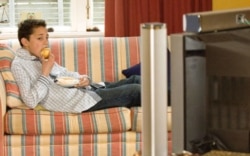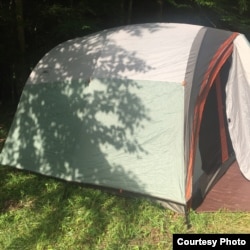And now, Words and Their Stories, from VOA Learning English.
A couple of years ago, we wrote a story titled “Ways We Sleep.” We taught expressions such as catch a few z’s, get some shuteye, nod off, and turn in … just to name a few.
There are many, many sleep expressions in English. But today we talk about ones that deal with problem solving.
Now, it is common to sleep on a bed. When we go camping, we sleep on the ground, or we sleep on a cot. If we fall asleep watching television or when we visit a friend’s house, we may sleep on a couch. And sometimes we may have to sleep on a floor.
But “to sleep on” has another meaning.
If I have a problem and cannot think of an answer, I can “sleep on it.” Often an answer comes to me the next day.
Let's say some co-workers are working on a project together, and they run into a difficult problem. No one can think of a way to solve it. One person might say, “Look, we’re not getting anywhere. So, let's sleep on it. Tomorrow we can try to figure this out.”
To “sleep on" something means you give yourself time to think about a problem overnight. You plan to make a decision about it later.
This does not have to mean that you are actively thinking about the problem. Your subconscious may be working on it. For example, if I am writing a story and run into a problem, I often sleep on it. I think about the problem before I go to sleep and hope that my sleeping self comes to the rescue!
Sometimes we use this expression when we just want more time to pass. We also use it when we want to look at a problem with a rested mind. We know that sleep is necessary to be healthy, both mentally and physically. Sometimes a problem doesn't look so bad the next day after a good night’s sleep.
Here is another sleep expression.
Some problems are not a big deal — they are not important. You can describe them as “nothing to lose sleep over.” And if you want to say you are not going to worry about something, you can say you’re “not going to lose sleep over it.”
Let’s listen while two friends use this expression.
Mark: Hey Tish, did you hear about the new apartment building coming to our neighborhood? It’s going to have 100 units!
Tish: I did. Why do you ask?
Mark: It will mean a lot MORE people and a lot LESS parking. Aren’t you upset?
Tish: Well Mark, we DO live in a city. And cities have lots of people. So, I’m not losing any sleep over it -- if that’s what you’re asking.
Mark: Good for you. I’ve lost A LOT of sleep over it.
Okay, who is upset by the new apartment building – Mark or Tish?
If you said Mark, you are right!
For our last expression, we talk about serious problems – problems in which your life might be at stake!
If you “sleep with one eye open,” you are too distrustful to fall asleep. You are suspicious of others around you. You are worried or even fearful that someone or something will hurt you in your sleep.
For example, once I took a friend camping with me. She was a city girl and had never been camping. While sleeping in a tent in in the woods, she heard animal sounds and movements in the woods all night. In the morning, I asked her how she slept. She said, “I didn't sleep a wink. I slept with one eye open the whole night!”
And that's the end of this Words and Their Stories.
If you run into a problem with English, try sleeping on it! Maybe the answer will come to you with the morning sun.
Until next time … I'm Anna Matteo.
Anna Matteo wrote this for VOA Learning English.
__________________________________________________________________
Words in This Story
camping –n. the activity of sleeping outdoors in a tent or cabin usually for fun
cot –n. a thin, light bed that can be folded
couch –n. a piece of furniture that a person can sit on or lie down on
cushion –n. a soft pillow or pad to rest on
subconscious –n. the part of a person’s mind that they do not consciously know about
unit –n. a single thing, person, or group forming part of a whole
at stake –n. in a position to be lost if something goes wrong
sleep a wink –v. to sleep for a very short period of time
____________________________________________________________________
What do you think of today’s program on sleep expressions? We want to hear from you.
We have a new comment system. Here is how it works:
- Write your comment in the box.
- Under the box, you can see four images for social media accounts. They are for Disqus, Facebook, Twitter and Google.
- Click on one image and a box appears. Enter the login for your social media account. Or you may create one on the Disqus system. It is the blue circle with “D” on it. It is free.
Each time you return to comment on the Learning English site, you can use your account and see your comments and replies to them. Our comment policy is here.











Forum